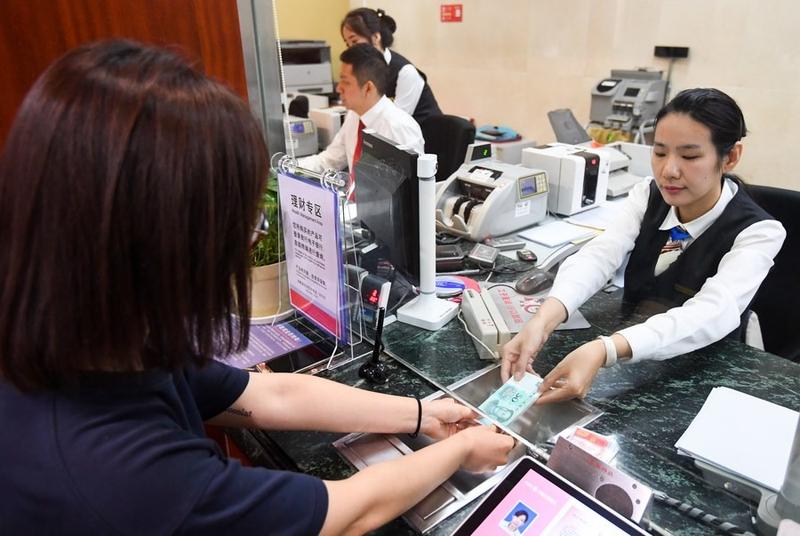 A staff member (right) hands over a stack of renminbi banknotes to a customer at an Industrial and Commercial Bank of China (ICBC) branch in Beijing, capital of China, Aug 30, 2019. (PHOTO / XINHUA)
A staff member (right) hands over a stack of renminbi banknotes to a customer at an Industrial and Commercial Bank of China (ICBC) branch in Beijing, capital of China, Aug 30, 2019. (PHOTO / XINHUA)
With higher education and independent financial awareness, women on the Chinese mainland are more willing than their global peers to get involved in household wealth management and make investment decisions.
According to a report released by multinational investment bank UBS, more than 80 percent of the women it surveyed on the mainland are devoted to managing their short-term household money matters, such as daily expenses, financial budgets and cash flow.
When it comes to making long-term financial plans, about 49 percent of the respondents said they take a leading role in making household financial decisions, while 37 percent share the responsibility with their spouses.
We’re happy to see a more independent side of women on the mainland and the ‘she economy’ has become an impetus in social and economic development. We can see the trend not only from their rising consumption power, but also from their tendency to manage their own wealth.
Lyu Zijie, Director of wealth management, UBS China
Only 14 percent allowed their husbands to dominate their household possessions — the lowest among all the nine global markets covered in the survey. The global ratio is 58 percent while Hong Kong’s stood at 71 percent — the highest.
Among the factors that prevent women from making financial decisions, the two most important are acknowledgment of the spouse’s deeper knowledge of money affairs and a bigger focus on other matters.
ALSO READ: Millennial women are feminists, except when it comes to money
Although the report covered just 312 married women on the mainland with investable assets of at least US$1 million and 105 divorced and widowed women with investable assets of US$250,000 or more, there’s no doubt that mainland women have greater wealth management autonomy.
“We’re happy to see a more independent side of women on the mainland and the ‘she economy’ has become an impetus in social and economic development. We can see the trend not only from their rising consumption power, but also from their tendency to manage their own wealth,” said Lyu Zijie, director of wealth management at UBS China.
She said the incentives for women to take charge of wealth management include the general awareness of a longer life expectancy among women than men, and the necessity for and urgency of long-term financial plans, such as making preparations for retirement and medical care services.
It’s also found that young mainland women, aged 20 to 34, are more willing to make their own financial plans, compared with those in the elder bracket.
Cherry Lin, a 31-year-old Shanghai-based journalist, who has been married for a year, said she and her husband have been handling their own finances.
“We’ll exchange ideas on whether or not to invest in certain products. But we don’t save money to the extreme as we’re not willing to sacrifice the quality of our livelihood for that,” she said.
As for consumption, Lin said: “He won’t interfere with my purchasing habits as I use my own money to buy what I like. And vice-versa, he’s free to use his money to buy anything he wants.” Most newlyweds she knows manage their own individual financial matters too.
But when the day comes, they’re likely to manage a joint account for their child’s expenses, Lin said. Most likely, she’ll be the one who’ll take charge of it.
READ MORE: 'She economy' makes rapid strides
Post-COVID-19, mainland women are likely to be more conservative with investment, and will place greater focus on long-term products, according to UBS.
In Hong Kong, it is found that women are more likely than men to set aside money to deal with emergencies, according to a survey conducted by insurance firm Sun Life Hong Kong. Women are also more likely than men to exercise disciplined spending habits.


